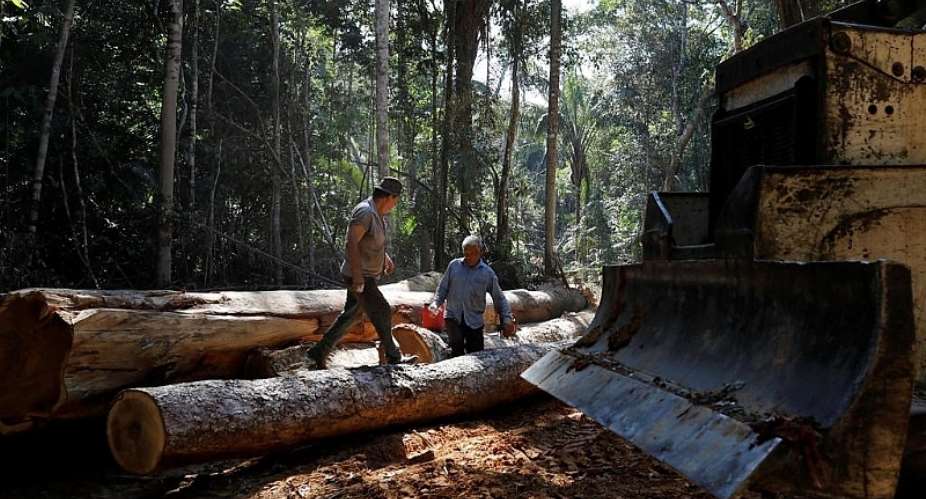As the French government discusses strategy for dealing with imported goods that drive deforestation, a report by watchdog Global Witness has revealed that France's leading banks are heavily involved in financing businesses linked to deforestation in the Amazon, the Congo Basin and Papua New Guinea.
France has pledged to stop imports which contribute to deforestation . . . palm oil, soybeans, beef, cocoa and rubber . . . by 2030.
“France is definitely going in the right direction in terms of political commitment and initiatives,” says Laurence Duprat, one of the authors of the Global Witness study.
“France is leading the way; it presented a new global alliance on forest protection last year and there is also extremely important regulation in terms of mandatory due diligence related to deforestation.”
But the report highlights a big gap between commitment and action.
“Our research showed that the French financial sector provided nearly US $2 billion between 2013 and 2019 to some of the most harmful agri-business companies directly involved in deforestation of the world's largest rainforests," Duprat continues.
This makes France the second largest EU contributor of funds to these companies.
“What we're showing here is that there can be commitments, lots of initiatives launched, but household-name banks in France are directly backing agri-businesses which are responsible for the destruction of our forest and climate.
"So there's a huge gap between commitment and action.”
Big-name banks stand accused
The report singles out BNP Paribas, Natixis and Crédit Agricole.
“BNP Paribas, France's largest bank, has been coordinating a 'transition bond' of US$500 million for Brazilian beef trader Marfrig,” says Duprat.
This was despite signing a commitment in 2015 to align its investments to ensure “net zero deforestation”.
The transition bond supports Marfrig's cattle purchasing chain of indirect suppliers, under which the agri-business giant buys cattle without knowing where they have come from.
Daniel Brindis, forests director at Greenpeace US, told AFP that Marfrig “do not have consistent assurances that the farms that sell to their direct suppliers are free of deforestation”.
BNP Paribas told Global Witness that all its clients in the Amazon “are either already certified or engaged in a certification process”.
The report also cites Natixis which contributed USD$50 million to a syndicated three-year revolving credit facility to Olam International. A 2016 report by environmental NGO Mighty Earth calculated that since 2012, Olam had deforested 20,000 hectares of Gabon forest.
“We strongly refute allegations of irresponsible deforestation or land conversion,” a spokesperson for Olam told AFP. He added that Olam works closely with the government of Gabon “to carefully balance Gabon's development needs with the imperative to conserve the country's unique forests”.
Duty of vigilance law
In March 2017 France introduced a landmark duty of vigilance law requiring multinational companies operating in France to prevent human rights abuses and environmental damage throughout their supply chain.
In the light of this, Global Witness believes the French government should call the banks to account.
“Companies, including banks, have a legal obligation to identify, mitigate and prevent these risks: environmental risks, but also abuses of human rights,” says Duprat.
“We are calling for the French government to increase checks and controls to make sure these banks respect their legal obligations and that they don't participate in deforestation. And we ask banks to improve their own policies and to implement them.”
Everyone, she says, should feel concerned by the issue of financing deforestation.
“Deforestation and the rapid breakdown of our climate is of concern to everyone. And as potential clients of these banks, French citizens should be aware of any risk or any sort of exposure, even if it's minimal, to the destruction of our planet.”
(with AFP)





 Akufo-Addo spotted ordering chiefs to stand for his handshake
Akufo-Addo spotted ordering chiefs to stand for his handshake
 Akufo-Addo ‘disrespects’ every chief in Ghana except Okyenhene — NDC Communicato...
Akufo-Addo ‘disrespects’ every chief in Ghana except Okyenhene — NDC Communicato...
 Supreme Court clears way for dual citizens to hold key public positions
Supreme Court clears way for dual citizens to hold key public positions
 Be transparent, don’t suppress the truth – Prof. Opoku-Agyemang to Jean Mensa
Be transparent, don’t suppress the truth – Prof. Opoku-Agyemang to Jean Mensa
 ‘I won’t tell the world I was only a driver’s mate during challenges’ – Prof Jan...
‘I won’t tell the world I was only a driver’s mate during challenges’ – Prof Jan...
 We’ll prosecute corrupt officials of Akufo-Addo’s govt – Prof Jane Naana
We’ll prosecute corrupt officials of Akufo-Addo’s govt – Prof Jane Naana
 [Full text] Acceptance speech by Prof Jane Naana Opoku-Agyemang as 2024 NDC Runn...
[Full text] Acceptance speech by Prof Jane Naana Opoku-Agyemang as 2024 NDC Runn...
 Election 2024: Don’t be complacent, we haven’t won yet – Asiedu Nketia cautions ...
Election 2024: Don’t be complacent, we haven’t won yet – Asiedu Nketia cautions ...
 Election 2024: Stop fighting over positions in Mahama’s next govt – Asiedu Nketi...
Election 2024: Stop fighting over positions in Mahama’s next govt – Asiedu Nketi...
 Prof Jane Naana Opoku-Agyemang will restore dignity of vice presidency – Fifi Kw...
Prof Jane Naana Opoku-Agyemang will restore dignity of vice presidency – Fifi Kw...
